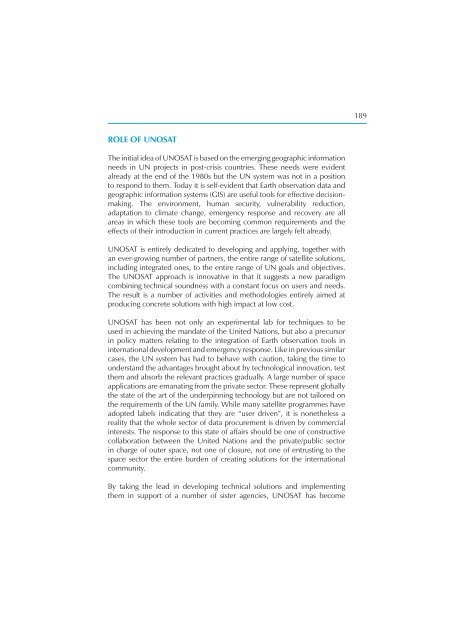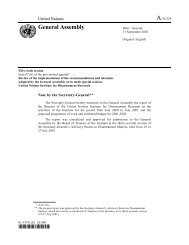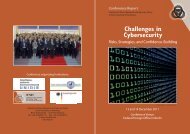Security in Space The Next Generation - UNIDIR
Security in Space The Next Generation - UNIDIR
Security in Space The Next Generation - UNIDIR
Create successful ePaper yourself
Turn your PDF publications into a flip-book with our unique Google optimized e-Paper software.
ROLE OF UNOSAT<br />
<strong>The</strong> <strong>in</strong>itial idea of UNOSAT is based on the emerg<strong>in</strong>g geographic <strong>in</strong>formation<br />
needs <strong>in</strong> UN projects <strong>in</strong> post-crisis countries. <strong>The</strong>se needs were evident<br />
already at the end of the 1980s but the UN system was not <strong>in</strong> a position<br />
to respond to them. Today it is self-evident that Earth observation data and<br />
geographic <strong>in</strong>formation systems (GIS) are useful tools for effective decisionmak<strong>in</strong>g.<br />
<strong>The</strong> environment, human security, vulnerability reduction,<br />
adaptation to climate change, emergency response and recovery are all<br />
areas <strong>in</strong> which these tools are becom<strong>in</strong>g common requirements and the<br />
effects of their <strong>in</strong>troduction <strong>in</strong> current practices are largely felt already.<br />
UNOSAT is entirely dedicated to develop<strong>in</strong>g and apply<strong>in</strong>g, together with<br />
an ever-grow<strong>in</strong>g number of partners, the entire range of satellite solutions,<br />
<strong>in</strong>clud<strong>in</strong>g <strong>in</strong>tegrated ones, to the entire range of UN goals and objectives.<br />
<strong>The</strong> UNOSAT approach is <strong>in</strong>novative <strong>in</strong> that it suggests a new paradigm<br />
comb<strong>in</strong><strong>in</strong>g technical soundness with a constant focus on users and needs.<br />
<strong>The</strong> result is a number of activities and methodologies entirely aimed at<br />
produc<strong>in</strong>g concrete solutions with high impact at low cost.<br />
UNOSAT has been not only an experimental lab for techniques to be<br />
used <strong>in</strong> achiev<strong>in</strong>g the mandate of the United Nations, but also a precursor<br />
<strong>in</strong> policy matters relat<strong>in</strong>g to the <strong>in</strong>tegration of Earth observation tools <strong>in</strong><br />
<strong>in</strong>ternational development and emergency response. Like <strong>in</strong> previous similar<br />
cases, the UN system has had to behave with caution, tak<strong>in</strong>g the time to<br />
understand the advantages brought about by technological <strong>in</strong>novation, test<br />
them and absorb the relevant practices gradually. A large number of space<br />
applications are emanat<strong>in</strong>g from the private sector. <strong>The</strong>se represent globally<br />
the state of the art of the underp<strong>in</strong>n<strong>in</strong>g technology but are not tailored on<br />
the requirements of the UN family. While many satellite programmes have<br />
adopted labels <strong>in</strong>dicat<strong>in</strong>g that they are “user driven”, it is nonetheless a<br />
reality that the whole sector of data procurement is driven by commercial<br />
<strong>in</strong>terests. <strong>The</strong> response to this state of affairs should be one of constructive<br />
collaboration between the United Nations and the private/public sector<br />
<strong>in</strong> charge of outer space, not one of closure, not one of entrust<strong>in</strong>g to the<br />
space sector the entire burden of creat<strong>in</strong>g solutions for the <strong>in</strong>ternational<br />
community.<br />
By tak<strong>in</strong>g the lead <strong>in</strong> develop<strong>in</strong>g technical solutions and implement<strong>in</strong>g<br />
them <strong>in</strong> support of a number of sister agencies, UNOSAT has become<br />
189








